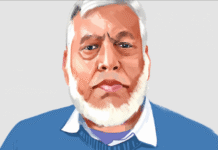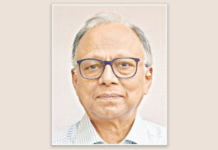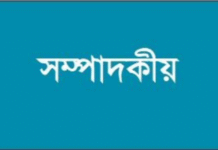
Last update on: Sat Apr 19, 2025 12:27 PM

The immigration lines in most developed countries are smooth as most passengers simply scan their e-cards and walk through. Bangladeshi passport holders, however, often appear to be a spanner in the wheel that blocks the flow. The queue behind us grows longer and more restless. Officials need time to verify our documents. Occasionally, their superiors surface from hidden cubicles to cast more suspicious eyes. Once cleared, our bags come under a fresh round of random profiling. Our alien-coloured green passport is a symbol of exclusion. While the image-driven media creates a hearty narrative of global mobility full of opportunities and connectivity, the aspirations of most Bangladeshis are met with resistance through no fault of their own.
Bangladeshi passports are ranked among the weakest in the world. According to the latest edition of the Henley Passport Index, our passport stands at 100th, with war-torn states like Libya and the Palestinian territories in our cohort. The weak status of our passport is a reality check for many who suffer from false-inflated egos. It exposes us to dehumanising processes that include visa hassles, exploitative syndicates, and immigration humiliation. It affects our global mobility in business, education, family visits, and tourism. In the year up to March 2024, the UK Home Office rejected 53 percent of visa applications by Bangladeshis, against the global average of 21 percent. The figure is nearly the same for Schengen states. Last month, the Malaysian airport authority denied entry to 51 Bangladeshi nationals despite their having valid visas, allegedly for “loitering suspiciously in the arrival hall.”
The difficulty in getting visas has contributed to the rise of an “industry” that profits from complexity and opacity. Many embassies employ middlemen or agents who levy hefty consultation or processing fees. In some instances, digital slots are allegedly monopolised by syndicates and sold by informed insiders. Then there is the added trouble of travelling to a third country to obtain consular services. If things are less than favourable there, you may encounter additional challenges in obtaining a second visa before attending your main interviews.
Even licensed visa service firms are not beyond criticism, being accused of delaying regular punters to encourage the purchase of premier services. A recent exposé revealed that a renowned visa agency held onto Italian visas for over a year, demanding heavier fees. On the other hand, freelancers entice visa-seekers with promises of guaranteed visas. First-time travellers and those unfamiliar with the digital protocol are easy targets. These visa consultants operate in the shadow zone of legality. Victims have hardly any legal protection from these scheming agents and scammers. The reason is simple: the state does not value its citizens enough.
In most cases, we consider visa rejection to be a personal failure. But it is time for our state, particularly our diplomats, to realise that the refusal is often a failure of our soft power diplomacy. The state must stand by its citizens to reclaim the narrative. If Bangladeshis are considered burdens or threats, it will affect our labour market, trade, education, and cultural exchanges. As a country with a high unemployment rate, many see the outside world as a provider of life-changing opportunities. Yet, they are frustrated by the obstinacy of the legal channels. Aspiring immigrants frequently fall prey to scammers, who encourage them to undertake perilous journeys involving smugglers, fake documents, and alternative travel routes through forests, hills, or oceans. The popular code used for such a process is known as “game.” In recent years, thousands of Bangladeshis have reportedly tried to enter Europe through gaming. Some of them drowned in the Mediterranean Sea. Authorities arrested many and relocated them to temporary refugee shelters. Some ended up working as undocumented labourers in various regions of Europe.
The lack of a global reputation for Bangladeshi travellers discourages not just migrants, but also tourists and professionals. With the middle class on the rise, there is a growing demand for travelling abroad, attending international events, and sending children to overseas institutions. Genuine students with scholarships or businessmen with all-paid-for trips are denied visas for no apparent reason. The stated reasons, such as “low income” or “insufficient ties to home,” often exacerbate the situation. The weak positioning of our travel document is due to weak diplomatic initiatives, inefficient migration services, and a non-existent passport strategy.
With a global icon now at the helm of the government, the time is right for the Ministry of Foreign Affairs to push for fair visa policies for Bangladeshi nationals. The ministry must take proactive steps to establish bilateral visa facilitation agreements with key partners, particularly for students, businesses, and migrant labourers. There should be advocacy for establishing more embassies in Dhaka, joint application centres, and long-term visa processing setups. We must examine the reasons behind Dhaka’s status as a challenging posting for overseas envoys and enhance the basic amenities provided to them. Conversely, we need to upgrade our documentation process to enhance the credibility of our certificates and paper trails.
Additionally, the Ministry of Expatriates’ Welfare must coordinate with law enforcement, civil aviation, and anti-corruption bodies to end the nefarious “visa industry.” Government-run support portals must be empathetic and supportive to promote transparency and reduce dependency on middlemen. There should be steps to increase our skilled labour pool, targeting specific countries for fast-track mobility arrangements. Already, the chief adviser has mentioned the need for nurses and carers in the global market.
We can follow bilateral models like the Indo-German skilled workers’ agreement or the Sri Lanka-Japan Specified Skilled Worker (SSW) programme to curate a niche market. The foreign ministry also has a mandate to raise the fair visa issue through diplomatic and multilateral channels. We must remind the Global North of its touted moral high ground and emphasise that mobility is a development right, not a privilege.
The time has come to promote our culture through public diplomacy. We need a database of our diaspora talent and showcase them to promote national reputation before the host countries, replacing the “risk” label. At the same time, we need to invest in our youth so they become globally informed citizens of the world. It is our duty to give them the freedom to study, to love, to work, and to dream beyond borders. We must train them to export our ideas, forge partnerships, and bring knowledge home. But first, we need to unlock our windows before expecting the world to open its gates for us. It’s time to reclaim the dignity of our green passports, not with misplaced patriotism, but with strategic interventions. We look forward to the day when Bangladeshis walk through green channels, proud of their green passports.
Dr Shamsad Mortuza is professor of English at Dhaka University.
Views expressed in this article are the author’s own.









